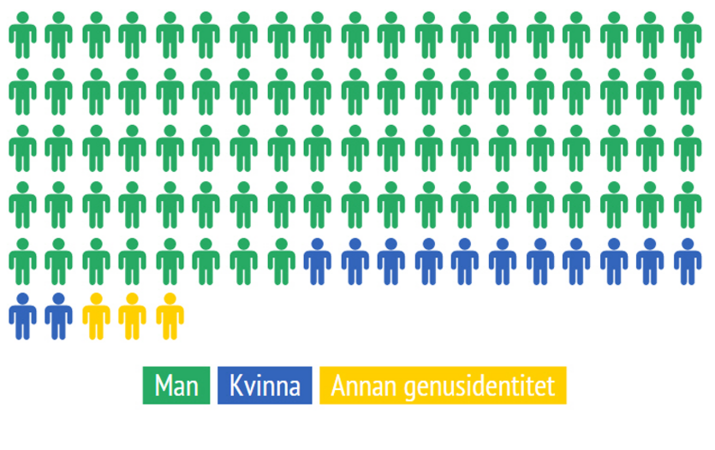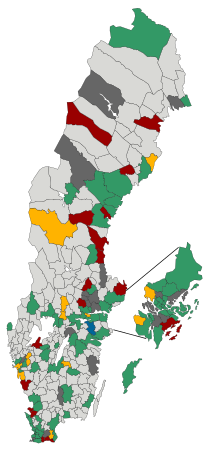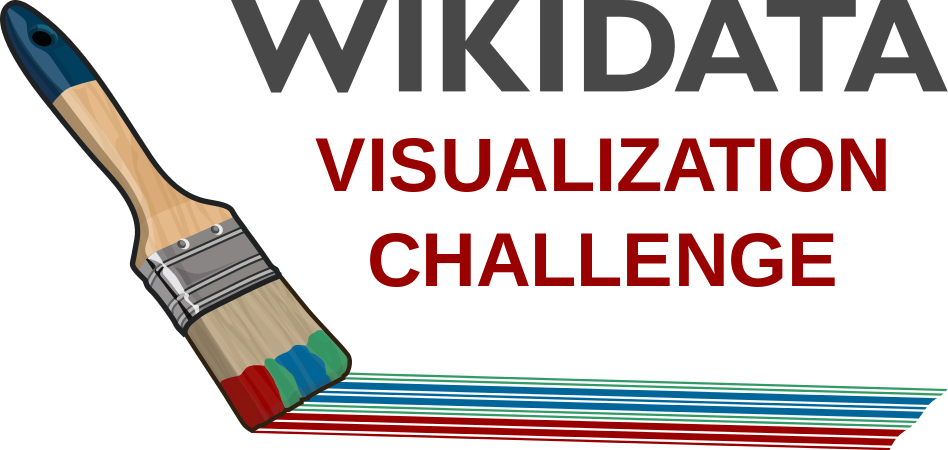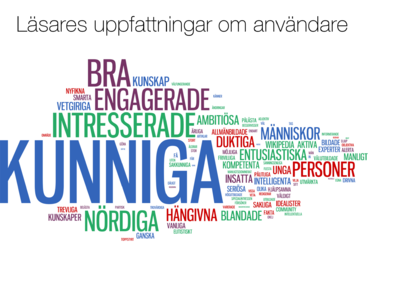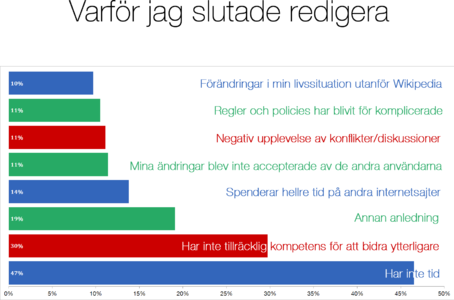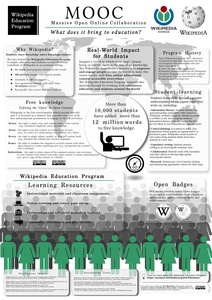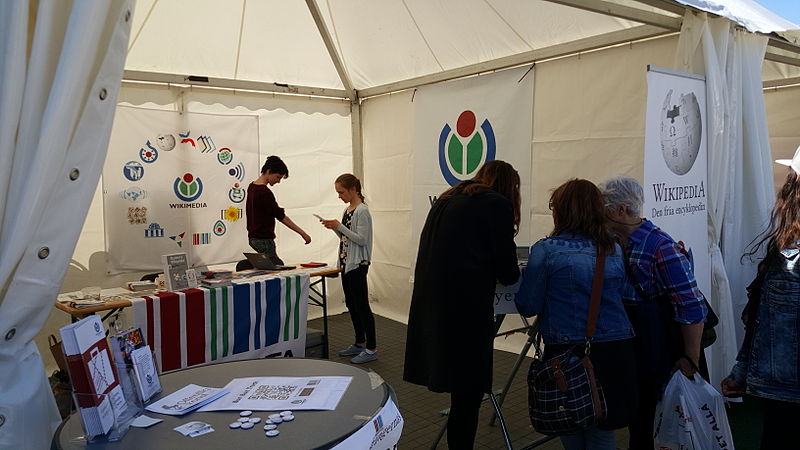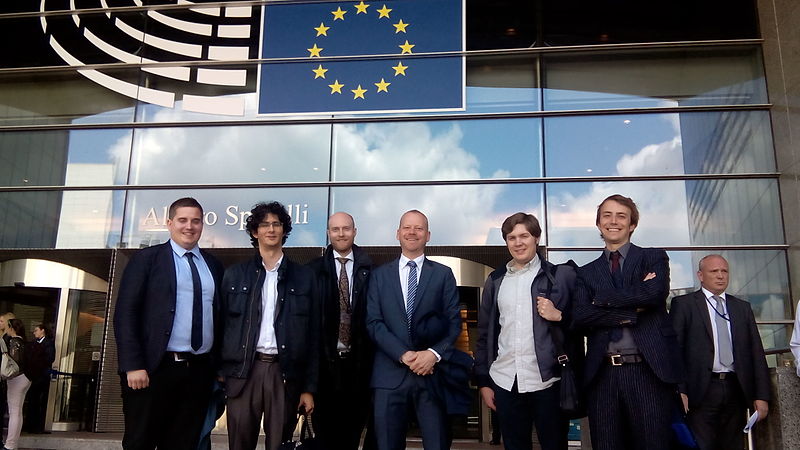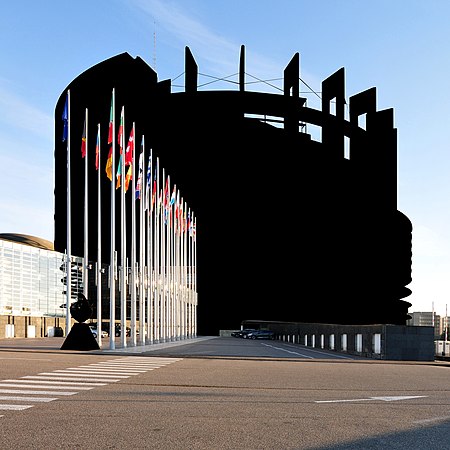Grants:APG/Proposals/2014-2015 round1/Wikimedia Sverige/Progress report form
Purpose of the report[edit]
This form is for organizations receiving Annual Plan Grants to report on their progress after completing the first 6 months of their grants. The time period covered in this form will be the first 6 months of each grant (e.g. 1 January - 30 June of the current year). This form includes four sections, addressing global metrics, program stories, financial information, and compliance. Please contact APG/FDC staff if you have questions about this form, or concerns submitting it by the deadline. After submitting the form, organizations will also meet with APG staff to discuss their progress.
Global metrics overview - all programs[edit]
We are trying to understand the overall outcomes of the work being funded across our grantees' programs. Please use the table below to let us know how your programs contributed to the Global Metrics. We understand not all Global Metrics will be relevant for all programs, so feel free to put "0" where necessary. For each program include the following table and
- Next to each required metric, list the outcome achieved for all of your programs included in your proposal.
- Where necessary, explain the context behind your outcome.
- In addition to the Global Metrics as measures of success for your programs, there is another table format in which you may report on any OTHER relevant measures of your programs success
For more information and a sample, see Global Metrics.
Total[edit]
| Metric | Achieved outcome | Explanation |
| 1. # of active editors involved | 342 | |
| 2. # of new editors | 321 | |
| 3. # of individuals involved | 2,294 | |
| 4. # of new images/media added to Wikimedia articles/pages | 1,279 | |
| 5. # of articles added or improved on Wikimedia projects | 2,201 | |
| 6. Absolute value of bytes added to or deleted from Wikimedia projects | 4,092,711 |
Community support[edit]
| Metric | Achieved outcome | Explanation |
| 1. # of active editors involved | 57 | |
| 2. # of new editors | 67 | |
| 3. # of individuals involved | 332 | |
| 4. # of new images/media added to Wikimedia articles/pages | 438 | |
| 5. # of articles added or improved on Wikimedia projects | 729 | This is what we can verify. This is really hard to measure since editors who do edits from activities in this program regurarly mix them up with their normal edits. |
| 6. Absolute value of bytes added to or deleted from Wikimedia projects | 306,664 | This is what we can verify. This is really hard to measure since editors who do edits from activities in this program regurarly mix them up with their normal edits. |
Content liberation[edit]
| Metric | Achieved outcome | Explanation |
| 1. # of active editors involved | 85 | |
| 2. # of new editors | 45 | |
| 3. # of individuals involved | 724 | |
| 4. # of new images/media added to Wikimedia articles/pages | 506 | This is what we can verify. We have reason to believe that the Europeana images added is around 1500, but since the uploads were made to categories that already had images it is hard to verify which were done now and which were done earlier. |
| 5. # of articles added or improved on Wikimedia projects | 712 | |
| 6. Absolute value of bytes added to or deleted from Wikimedia projects | 1,183,656 |
Free knowledge in education[edit]
| Metric | Achieved outcome | Explanation |
| 1. # of active editors involved | 7 | |
| 2. # of new editors | 207 | |
| 3. # of individuals involved | 781 | |
| 4. # of new images/media added to Wikimedia articles/pages | 55 | |
| 5. # of articles added or improved on Wikimedia projects | 185 | |
| 6. Absolute value of bytes added to or deleted from Wikimedia projects | 770,271 |
Reach and readers[edit]
| Metric | Achieved outcome | Explanation |
| 1. # of active editors involved | 188 | These participated in the Wikidata Menu Challenge. |
| 2. # of new editors | 2 | These signed up in the Wikidata Menu Challenge. |
| 3. # of individuals involved | 429 | Around half of these participated in the translation rally on translatewiki.net. |
| 4. # of new images/media added to Wikimedia articles/pages | 280 | All through the Wikidata Menu Challenge. |
| 5. # of articles added or improved on Wikimedia projects | 300 | All through the Wikidata Menu Challenge. |
| 6. Absolute value of bytes added to or deleted from Wikimedia projects | 1,832,120 | All through the Wikidata Menu Challenge. |
Free knowledge awareness[edit]
| Metric | Achieved outcome | Explanation |
| 1. # of active editors involved | 5 | |
| 2. # of new editors | 0 | This entire program had no goals in recruiting new editors so this was an expected result. |
| 3. # of individuals involved | 28 | |
| 4. # of new images/media added to Wikimedia articles/pages | 0 | This entire program had no goals in adding media so this was an expected result. |
| 5. # of articles added or improved on Wikimedia projects | 0 | This entire program had no goals in editing so this was an expected result. |
| 6. Absolute value of bytes added to or deleted from Wikimedia projects | 0 | This entire program had no goals in editing so this was an expected result. |
Telling your program stories - all programs[edit]
Please tell the story of each of your programs included in your proposal. This is your chance to tell your story by using any additional metrics (beyond global metrics) that are relevant to your context, beyond the global metrics above. You should be reporting against the targets you set at the beginning of the year throughout the year. We have provided a template here below for you to report against your targets, but you are welcome to include this information in another way. Also, if you decided not to do a program that was included in your proposal or added a program not in the proposal, please explain this change. More resources for storytelling are at the end of this form. Here are some ways to tell your story.
- We encourage you to share your successes and failures and what you are learning. Please also share why are these successes, failures, or learnings are important in your context. Reference learning patterns or other documentation.
- Make clear connections between your offline activities and online results, as applicable. For example, explain how your education program activities is leading to quality content on Wikipedia.
- We encourage you to tell your story in different ways by using videos, sound files, images (photos and infographics, e.g.), compelling quotes, and by linking directly to work you produce. You may highlight outcomes, learning, or metrics this way.
- We encourage you to continue using dashboards, progress bars, and scorecards that you have used to illustrate your progress in the past, and to report consistently over time.
- You are welcome to use the table below to report on any metrics or measures relevant to your program. These may or may not include the global metrics you put in the overview section above. You can also share your progress in another way if you do not find a table like this useful.
Community support[edit]
| Target | Last year (if applicable) | Progress (at end of Q2) | Projected (end of year) | Comments |
|---|---|---|---|---|
| Give support to 40 "active editors" before the end of the year.[CS 1] | N/A | 25 | 35 | Most frequent users have already borrowed equipment from the pool of technology, meaning not as many active users Q3 and Q4. Some large community projects will on the other hand bring in more active editors. |
| Give support to "active editors" 120 times before the end of the year.[CS 1] | N/A | 80 | 140 | Equipment from the pool of technology on long duration loans counted per week or use, not only as one occasion. |
| Get 100 bot-flagged "productive edits" on, in total, at least five different language versions before the end of the year. | N/A | 0 | 100 | The Bot Academy will be held in the fall. |
| Announce all resources made available on Wikimedia Commons or Wikidata by the chapter within one month after finished upload. | N/A | All cooperations announced either in This Month in GLAM and/or in blog or press releases. | ||
| Get 20 "surviving editors" from diversified target groups during the year. | N/A | 2 | 20 | We have had 18 Rolling new active editors from these targeted activities. |
| Invite all "productive new editors" to the Teahouse within five working days from their first "productive edit". | N/A | - | The question functionality on the Swedish Teahouse is broken, so we have not been sending these invites yet. | |
| Get recurring offline meetings aimed at "active" contributors in five cities will be supported during the year. | 4 | 3 | 4 | Not enough Wikimedians are interested in meetings AFK to build up communities in smaller cities. |
| Support four activities initiated by the community open to all Wikimedians including at least two persons before the end of the year. | 6 | 3 | 6 | |
| Get two new groups of different subject matter experts to sign up on WikiProject pages before the end of the year. | N/A | 0 | 2 | Some are on the way, but haven't signed up yet. |
| Get three related groups to sign up on Wikiprojects we are involved with before the end of the year. | N/A | 1 | 3 | Some are on the way, but haven't signed up yet. |
- Notes
In the Community support program we have continued working with both our more direct support to the existing community but also projects to recruit new users to grow a larger and more diverse community.
The direct support to existing users include our pool of technology equipment, grants for hosting photo hunts and attending events, help with press accreditation and other activities. Our pool of technology has been used by more then 15 different users to upload over 1,476 media files on commons and use in the projects, and many of these users are returning to borrow the equipment over and over again. Furthermore, grants have been used by volunteers to go on photo hunts, organize edit-a-thons, participate and present projects at conferences and similar activities. As some of the projects are supported in more then one way, i.e. volunteers use both grants and equipment from the pool of technology, there is an overlap and the number of images uploaded and used in articles is hard to measure. Also through the pool of technology, more than 3,000 images, all CC BY-SA, have been uploaded to Mapillary and added to their map.
For increased diversity, we have organised and supported edit-a-thons throughout Sweden, and these activities have involved 130 individuals. The success has largely been a matter of where we've managed to establish a good local network of partners, for example the larger cities such as Gothenburg and Stockholm. We have supported a group of volunteers in Gothenburg to organize weekly edit-a-thons, themed on content gender gap. The more scattered activities in Stockholm culminated in early June with an all female edit-a-thon attracting 20 participants, and we intend to follow the good example set by the Gothenburg community and organize weekly edit-a-thons in Stockholm to support a growing local community of new and experienced users. Until now, we've had more Rolling new active editors than Surviving new editors but we expect regular edit-a-thons will help support more new users to become Surviving new editors.
As part of the Wikipedia Towns project we have supported two events in Hedemora where local volunteers have gathered to photograph as well as a planning and launch event around the first QRpedia signs. These projects will help to fulfill our goal of regular meetings and activities in five cities. With the Royal Armoury (Livrustkammaren) being one of the Wikipedia Town participants in Stockholm, their commitment also counts towards our outreach to experts as a they host their own edit-a-thons to improve and add content on Wikipedia in multiple languages to make the impression of the QRpedia codes better for visitors to the museum.
We have established partnerships with five research institutions and two of these have faculty engaged with editing and reviewing Wikipedia topics in their research area and activities are planned. This will give us a better understanding of our projects and our community.
-
Volunteers with cameras from the pool of technology at a photo hunt at Bispbergs mine.
-
Photo from the women's cross-country sprint quarterfinals at the FIS Nordic World Ski Championships 2015 in Falun.
-
Ponderosa at Sätra brunn, photo taken at a photo hunt.
-
Infographic showing the (lack of) diversity of the editing community on Swedish Wikipedia, survey from March 2015.
-
An event focusing on female main characters on Wikipedia was organized at the Museum of World Culture in Gothenburg during the International Women's Day, 8 March 2015.
Content liberation[edit]
| Target | Last year (if applicable) | Progress (at end of Q2) | Projected (end of year) | Comments |
|---|---|---|---|---|
| Distribute material to 30 content owners organisations before the end of the year. | N/A | 30 | 50 | |
| Get 50% of organisations that previously released free content to do it again before the end of the year. | 11 | 15 | ||
| Get five organisations that previously have not released free content to do it before the end of the year. | 1 | 5 | ||
| Get a 50% 'helpful rating' from GLAM staffers in a survey on documentation for batch uploading by the end of October. | N/A | Cannot be evaluated before October. | ||
| Get a 90% 'less support needed rating' from GLAM staffers in a survey on releasing freely licensed material by the end of October. | N/A | Cannot be evaluated before October. | ||
| Complete batch uploads from three GLAM institutions to Wikimedia Commons by the end of the year. | 4 | 6 |
In our Content liberation program we have successfully continued our work with GLAM support, batch uploads and awareness of the advantages for institutions in using free licenses and to open up datasets and collections.
Within the GLAM support the work we have done with the Council of Central Museums has resulted in a commitment from them to put the work they do with Wikimedia projects in their ordinary plans for next and future years, meaning that we'll move on from pilot phase to having GLAMs working with Wikipedia as something in their normal day to day work. Work here also includes collaboration with Women on Wikipedia in hosting edit-a-thons, QRpedia codes at the Royal Armoury with the Wikipedia Towns project and support with batch uploads and copyright questions.
The Council of Working Life Museums have continued the Work With Sounds project, and more than 500 sounds, films and photos are uploaded to Wikimedia Commons. The entire database and all material is released under free licenses, and as more recordings are done, more material are released and uploaded. During the fall more work will be done in improving the quality of the meta data to increase the usability, and to make it easier to include the material in other Wikimedia projects. Changes in the MediaWiki API during the summer halted the uploads, but the automatic upload has since been improved to work better. Four workshops with Working Life Museums were held during the winter, but more follow up work needs to be done to get better editor retention and work done by the editors following each workshop.
As part of our Batch Upload project we have undertaken or assisted with several batch uploads from various institutions including: The National Library, Europeana, the [Category:Images from Nordiska museet/Fashion plates Nordic Museum] and more. These projects have been less hands on than previous years showing that previous efforts have enabled these institutions handle most of these processes themselves. This project was further expanded to include content submissions for Wikidata. This is done both through adding new statements and through sourcing existing statements within the area of expertise of a GLAM institution. Here we have continued our work with the Swedish Centre for Architecture and Design and more recently received external funding to start a similar initiative with the Swedish National Maritime Museums. In addition to deepening our ongoing collaborations with the GLAM sector this brings Wikidata to the attention of this sector, thus enabling the participation of new GLAM partners whose collections are not suitable for Wikimedia Commons. For Wikidata this is of great benefit since sources for statements was one of its great promises but is still (other than imported from Wikipedia) largely missing.
We received external funding to continue our project Offentligkonst.se, a free database of public works of art in Sweden which is integrated and maintained via lists on Wikipedia. The core of this work consists of contacting municipalities in Sweden to get them to release information about their public art and inform them about the value of Open Data. During Q1+Q2 the number of datasets included was increased from 26 to 77 which together represents 25% of all municipalities in Sweden. In total we have now reach out to approx. 50% of all Swedish municipalities. In addition to bringing awareness of Open Data and the possibility of collaboration with Wikipedia to the attention of the municipalities we have also observed an increased activity from the Swedish Wikipedia community around improving the lists, writing articles about the subjects and uploading images. The as of yet unresolved Freedom of Panorama case in the Supreme Court however means we have not been able to fully take advantage of the lists as a platform for getting new editors involved.
We have some new interesting collaborations coming up, ranging from a new organizational member in the chapter; Swedish Academy, who decides who receives the Nobel Prize in literature, to a company who have released material as a response to not being able to allow photographers to visit a closed industrial site.
We continued working with Mapillary, a freely licensed, crowdsourced alternative to Google streetview, on facilitating uploads of images from their service to Wikimedia Commons. This collaboration has now born fruit through a "Share to Wikimedia" button directly in the interface. For us this is an interesting example of how we can work to strengthen the bonds between Wikimedia and the rest of the Open Content movement.
Releasing content is not limited to media and texts but also include data. Wikimedia Sverige decided to focus a lot of attention to Open Data as there were ongoing directives from the state that this is an area where the authorities have to do more. We believed that we had a unique possibility to affect the decision makers at the beginning of their work so that they did not pick licenses that prevented us to include it on Wikidata and to help them prioritize what material to start with.
We received external funding for a number of projects that are aiming to reach both the public, researchers, companies and the authorities. We gave workshops, produced specialized information material directed to different groups with data, gave presentations, participated in fairs etc. This is a long term work to create the awareness of the issue for people to make smart choices. However, in a few cases this work also had a direct effect. For example, we participated and discussed the value of free knowledge in humanitarian aid at an event organized by the Swedish International Development Authority (SIDA) (we were one of the exhibitors). This led to a meeting where we helped guide them regarding licenses on their database (that has data of their international aid projects). This also led to a meeting with the Organization for Economic Co-operation and Development (OECD) as they are are working on a Open Data road map. Among other things we discussed the possibilities with Wikipedia Zero and put Wikidata on their radar. We also have an ongoing cooperation with the Swedish Water Authorities, a cooperation between a number of different agencies, that are planning to release data onto Wikidata in the future concerning different aspects of water.
One of the external grants we got from the Swedish Innovation Agency (Vinnova) was to do the Wikidata Visualization Challenge. Although a little bit fewer participants than expected, the winner has made an awesome visaulization on births and deaths of people on Wikidata. This can be used to demonstrate the richness of the information within Wikidata in a much more easily understood way than just showing the website as such.
-
Saw blade sharpening machine
-
Sound of Albi Circular Knitting Macine
-
Forge press
-
A map from the National Library uploaded through the Batch Upload project
-
Teotihuacán, an example of an image uploaded via Mapillary
-
Map showing the current state of the Offentligkonst.se-project
-
The logo for the Wikidata Visualization Challenge
-
Screenshot of the winner of the Wikidata Visualization Challenge
-
One of the many events where we participated and talked about Wikidata
Free knowledge in education[edit]
| Target | Last year (if applicable) | Progress (at end of Q2) | Projected (end of year) | Comments |
|---|---|---|---|---|
| Contact 50 researchers before the end of the year. | N/A | 8 | 50 | Activities are planned for the next few months. |
| Integrate Wikipedia studies in courses in at least 2 teacher training colleges before the end of the year. | 0 | 1 | Activities focused on establishing partnerships. | |
| Get at least five productive edits each from at least 10 different University level courses before the end of the year. | N/A | 4 | 8 | Some of the planned activities for 2015 will support classes starting at the beginning of 2016, and will not be included in metrics for 2015. |
| Expand network with 50 teachers before the end of the year. | N/A | 30 | 50 | |
| Get at least one productive edit each from 20 different primary school (year 7-9), secondary school and Swedish for immigrants classes before the end of the year. | N/A | 7 | 20 | |
| Get 10 new Open Educational Resources before the end of the year. | N/A | 1 | 5 | Projection based on known projects scheduled for 2015. |
| Get 100 new users on Wikibooks and Wikiversity before the end of the year. | N/A | 56 | 100 | In partnership with Stockholm University. |
The Wikipedia Education Program has so far this year involved 11 different institutions, of which 4 are university institutions. In 5 of these cases the instructing teacher has chosen to set up course page with the Education Extension on Swedish Wikipedia. This is the first time we've seen this tool put to use, announced in this blog post, and it has given the student activities greater visibility which is helpful both to the teacher and for growing the program. Course page data makes nice stories to tell new teachers about in outreach activities where educators are introduced to the concept of adding Wikipedia editing to their syllabus, 280 educators have had a first brief introduction so far this year, in seminars, workshops and conferences. As a result from this initial introduction, we expect educators from this group to join the Wikipedia Education Program in the coming years. Experienced teachers are really valuable to the program, as we have seen them sharing their stories to their networks, including students' voices. One of the classes has had successful help from one ambassador and one more ambassador has completed the online training on Swedish Wikiversity and is ready to support classes and help scaling the program.
In our partnership with Stockholm University, we've participated in the International Training Program for ICT4D, which so far has resulted in 56 new users. The participants in this International Program are decision makers and change agents in the national education system from around 20 countries in the Global South. The sessions are focused on introducing Wikipedia and the Wikipedia Education Program and the practical training is focused on Wikiversity as a collaborative tool for ICT in education and resource to their programs. Retention in this project is with Stockholm University, and the partnership has been successful and is set to continue throughout 2015.
From our partnership with Akvo Foundation, English Wikiversity now has a new learning resource in "Rainwater Harvesting" focusing on water insecure households and comprising over 100 000 bytes. This is their first pilot release to Wikiversity, they have a vast amount of more material that they consider to add to Wikiversity.
Another successful approach has been to engage with undergraduate and graduate courses and present them with research questions of interest for our work. This has given us an arena to talk about our work and projects with hundreds of students and a number of researchers. One professor assigned his students to design a prototype for categorizing images on Wikimedia Commons, another group was assigned with analyzing and proposing user friendly designs for Wikipedia, here's an account from the University Infotech site. We have seen some of the students getting involved as volunteer editors as they have learnt about the Wikimedia projects. It has also given us valuable knowledge and data that we have been able to use in project designs, evaluation and external grant applications. We have had these partnerships with 3 institutions and the results are reduced costs for research and evaluation and an established network of research institutions.
On the OpenBadges front a working prototype for a MediaWiki extension for handling OpenBadges was developed. This is now accessible for testing through Vagrant. To date a third-party platform has been used to issue badges to participants in the Education Program. Having talked to various members of our movement during Wikimania and other meet-ups we know that there is an interest in an integrated solution for OpenBadges.
-
8 open badges for "Wikipedia pedagogue 2015" have been issued in recognition of skills and contributions on the part of participating teachers in the Education Program.
-
2 volunteers have been awarded the open badge for "Wikipedia Ambassador" after completed online training.
-
From graduate student survey; Editors on Swedish Wikipedia by age.
-
From graduate student survey; Readers' opinions about the editing community on Swedish Wikipedia.
-
From graduate student survey; Chart showing readers' attitudes to Swedish Wikipedia.
-
From graduate student survey; "Why I stopped editing Wikipedia"
-
Poster about the Wikipedia Education Program presented at a conference in June 2015.
-
Graduate students at Umeå University present their prototypes for gamified applications for categorizing images on Wikimedia Commons, January 2015.
-
Webinar introducing Wikipedia editing to students at Linnæus University, March 2015.
Reach and readers[edit]
| Target | Last year (if applicable) | Progress (at end of Q2) | Projected (end of year) | Comments |
|---|---|---|---|---|
| Get 50 new media subscribers to the newsletter before the end of the year. | 50 | |||
| Get 10% more proactive stories about the Wikimedia projects in media before the end of the year. | 64 | 24 | 70 | The case in the Supreme Court will continue and we now have a Communication Manager to more actively work on this |
| Deploying QR-pedia signs in 3 municipalities before the end of the year. | N/A | 2 | 3 | There have also been signs added in Umeå, but they were paid for with another budget |
| Report 100% of all discovered and verified bugs within five working days. | 73 | 20 | 40 | Last year a lot of bugs in Visual Editor were reported when we discovered them on our edit-a-thons etc. However, we do not expect to experience that many problems during our events this year. |
| Not have translations lower than 95% for more than a month. | For January and February | 90% | This goal will most likely not be achieved as we are lacking funding for this work the rest of the year |
Wikimedia Sverige's work concerning reach and readers focus on two aspects:
- Increasing the amount of people interested and knowledgeable about Wikimedia and our projects, as well as the wider ecosystem of the free knowledge world. We are doing this by:
- Our newsletter;
- Getting out proactive media stories;
- Utilizing the concept of Wikipedia Towns and Wiki Loves Monuments to create interest;
- Taking part in public events such as a food fair to show the value of free knowledge in all aspects of life.
- Increasing the usability for the consumers of Wikipedia by supporting the work done by the Foundation. We are doing this by:
- Report bugs so that the software can be improved;
- Make sure that the interface is translated and easy to use for as many people in Sweden as possible.
The external communication is focusing on the use of newsletters, social media, blog posts and press releases where we inform about interesting parts of the chapter's work. We have a few projects that have been designed with their communication value in mind in order to increase our visibility. During Q1 and Q2 a decision to hire a dedicated Communication Manager was taken, and a successful hiring process took place.
Because of technical problems with our mailing server and a move to a new service provider the work on the newsletter came to an halt. This has prevented us to reach the 50 new subscribers we are aiming for. It is now working and we will actively promote the newsletter on social media during Q3 and Q4 and on different events. Worth pointing out is that the number of subscribers presented here exclude the members that receive the newsletter as part of their membership (i.e. we often manage to convince possible subscribers to become members instead (as the membership cost is low) and they are then not included in this number).
The work done around proactive media stories have to date been successful. We have been featured by media at 24 occasions in Q1 and Q2. This mean we are somewhat behind of our goal for 2015 with 70 media features (a 10% increase since last year), but we believe that we will reach our goal based on the activities planed for Q3 and Q4 and our newly hired staff. A large part of the coverage are concerning our database of public works of art that has reached the Supreme Court. The case has created a lot of media attention, and the reporting has been very positive and supportive for our side, which we feel very happy and proud about as we have actively promoted our view of the case.
The other thing is a lot of attention regarding the Freedom of Panorama debate in the European Parliament. Media picked up the information we sent out and helped put the issue on the political agenda in Sweden. This work took place together with a number of dedicated and fantastic volunteers. As part of many of our projects we have created communication plans and have actively sent out press releases and in other ways tried to tell our story which has lead to a number of articles in the media.
We have also seen some media interest for external grants we have applied for together with partners, e.g. around our work with a Swedish university to get researchers to write on Wikipedia. The grant applications have given us a lot of new partners that have helped spreading the information. This is a valuable lesson and we do see a possibility to further develop our communications regarding the launch of new projects, successful applications etc. We will try to form good working relationships with journalists and create more comprehensive lists of media contacts. For Q3 and Q4 we have a number of projects starting that we believe will generate a lot of media attention and the continuation of the Supreme Court case that we are confident will receive substantial media coverage, regardless of the outcome.
The work around creating new Wikipedia Towns with the use of QRpedia signs have started. One of the goals with the project is to increase brand visibility both for Wikipedia and for Wikimedia Sverige, as well as forming local partnerships and increasing local volunteer participation. The result from Umeå in 2014, with the project Umepedia, was very positive with a very intense news coverage of the small pilot project. Our hope is that this success will be repeated in the two new cities we are adding to the mix, and that we can continue to develop Umepedia further. During Q1 and Q2 the work with adding signs in two more cities started. They were added outside in Hedemora in cooperation with local organizations and the municipality in connection to some local celebrations to improve visibility. The majority of the work done by a dedicated volunteer with support from Wikimedia Sverige. 19 signs have been added in Hedemora and more will be added in Q3 and Q4. There was a lot of enthusiasm from the local organizations in Hedemora to contribute in different ways.
QRpedia signs were also added in the Swedish museum Livrustkammaren, where the historical royal arms and clothing are on display. (As this project was done in synergy with our GLAM work - and we will continue this approach in Stockholm for the rest of the year - the Wikimetrics for the edit-a-thons are reported in the Content Liberation section). A decent amount of media coverage have already been gained from the work in the project and by cooperating with our partners we can reduce the amount of work we have to do ourselves to get media coverage. There was also a continuation with the work in Umeå with a number of signs added in the city (that was purchased at the end of the previous Umepedia pilot project). A press event is being planned together with local partners that will take place in Q3. We are also talking with local partners in Umeå about adding signs on their buildings and areas.
We decided to include Wiki Loves Monuments into the Wikipedia Towns project as we can utilize the contest to initiate the first contacts with a number of actors in the cities. During Q2 the basic planning was done and contacts were taken with partners from the previous year(s). Our partners have agreed to work with us to gain more media coverage around the contest. We have done this contest four times before and we know how to do it very effectively now. Especially as we last year invested resources into more documentation and instructions. The value of strong partnerships that are ongoing is also something we have learnt is very valuable as we can contact them and get an answer very fast nowadays.
We also received external funding for the project Restaurants and Wikidata 2015. This project helped us highlight Wikidata for a new audience at a food fare and attracted a lot of interest from the volunteer community. Through an online contest 1.83 megabyte were added to Wikidata through over 9,000 edits together with 1,140 recordings of pronunciations. Menus for the participating restaurants were prepared and through this work we could reach out and explain the value of crowdsourcing and Open Data to a couple of hundred people. Many of whom clearly had never thought about this before but quickly grasped the value and turned out very supportive. It was easy to show the value of interactive menus available in hundreds of languages for tourists. A number of people stated their interest to start contributing with translations into their own language. This was, to our knowledge, the first Wikidata contest and we learnt that activating the active editors can create a huge impact in a short time and that there are practical problems with listing all contributions on the contest page (as there are technical problems when the lists become to long, and because it take a lot of time for the participants).
The work with the second aspect has been mainly about taking the time to report problems whenever they are encountered by the staff or volunteers and by supporting the translation of MediaWiki.
Bug reports have been added continuously and more staff members are now comfortable with doing this work themselves, but our tech staff is still doing most of the grunt work. In total 20 bugs have been reported in Q1 and Q2 on Phabricator.
The external funding we had received for the translation part was mainly used after the first two months of the year and for the last months no active work from the staff has been done on translatewiki.net. Our aim to increase long term participation have not reached the level where volunteers are able to keep up with the very fast development of MediaWiki and all added messages. A report outlining how to make it easier to add projects to translatewiki.net was authored and a number of instruction pages were improved to make it easier to understand the platform and to start contributing. This was based on the experiences from the project where we were teaching beginners how to contribute and took note on where they got stuck. The idea being that this could help increase the influx of volunteers and keep up the translation percentage. We also continued the work started in 2014 with Open Badges as we hope that they could help keep the interest to contribute to translatewiki.net alive over time. It is now a minimum viable product and is awaiting code review. At the end of the project we tried to encourage the existing community by organizing a Translation Rally. In total 44,844 messages were translated into 116 languages during the Rally. However, we saw some problems with the quality of some translations by a few users. We will try to adjust the rules slightly to reduce the stress if we organize something similar in the future.
External funding made it possible for us to work on making Wikidata, and it's dumps, more accessible to the larger Open Data community. This was done through developing a multilingual DCAT-AP description (the EU standard) for Wikidata and working with WMDE to getting this implemented in the dumping process of Wikidata. The code was developed in such a way that it can be readily reused once CommonsData is implemented or indeed for any WikiBase installation. This project has concluded with the publishing of the first live DCAT-AP description for Wikidata (link). In addition to being interesting for Wikimedia Sweden as a first try at a development project we also believe that the DCAT-AP profile and its coming inclusion on the Swedish Open Data Portal will increase the awareness and reuse of Wikidata.
-
Wikimedia Sverige at the food fair Smaka på Stockholm.
-
Presentation of the new QRpedia signs in Hedemora.
-
A graph of the first liveDCAT-AP description of Wikidata.
-
A graph of the contributions during the Translation Rally.
Free knowledge awareness[edit]
| Target | Last year (if applicable) | Progress (at end of Q2) | Projected (end of year) | Comments |
|---|---|---|---|---|
| Five new relations with opinion leaders and decision makers before the end of the year. | N/A | 73 | 95 | Mainly from the International Training Program for ICT4D which we have one more event planned with |
| Collaboration with two like minded organisations before the end of the year. | 0 | 3 | 5 | Open Knowledge Sverige, Creative Commons Sverige, Open Knowledge Finland |
| One impact matrix before the end of March. | N/A | Done | Done | |
| Meet all 20 Swedish EU parliamentarians (MEPs) before the end of the year. | 0 | 9 | 20 | |
| Initiate contact with one public funder before the end of the year. | N/A | 4 | 5 | Vinnova, National Post and Telecom Agency, Horizon2020 (MSB), Stockholm city |
| Get one overarching agency to actively encourage the use of Wikimedia's projects in a new way before the end of the year. | N/A | 1 | 1 | National Agency for Education |
The chapter has a good visibility in Sweden on different arenas and we have had great volunteer support. The volunteer activity has been coordinated with the office to a large degree. This has made it possible for Wikimedia Sverige to be more active on the international and national political scene than ever before and surpassed our goals tremendously in some areas.
Internationally we have worked on three different aspects:
- We have been supporting the work done by the Wikimedia movement in Brussels. Together with nine chapters we are co-funding the cost for the office there with one staff member. He is helped by one volunteer (a former member of the Swedish Parliament) that are working full time with these issues since the beginning of the year. An impact matrix has been developed that is outlining what issues to keep an eye and work on. This will help us to be more prepare and to plan our future work better and help to divide the task better. Also other chapters will hopefully find this material valuable. Chapter representatives have also been in contact and meet 9 of the Swedish MEPs to discuss political issues that we believe have a negative impact on our projects. Furthermore they work on coordination of lobbying activities with organizations that share our view on certain topics, build a database of important contacts, take part in all relevant EU copyright dialogues, meetings and consultations, and support volunteers that want to take part in our EU advocacy activities. They have also organized a couple events in Brussels where future policy work has been discussed and how to coordinate it between chapters and the WMF. The details of this is reported in Wikimedia Deutschland's Progress report. Our activities in Brussels has also led to discussion with a handful of important decision makers and opinion leaders.
- A lot of new contacts with decision makers in the international aid scene have been taken. There is a large overlap of interests with the Wikimedia movement, and these organizations have a lot of possibilities to influence politics in many different countries all over the world. We have been in contact about free knowledge and Open Data with international organizations such as OECD, Unesco and Humanitarian Open Street Map Team (HOT) and talked about how we could work together in the future. We also participated at an event organized by the Swedish International Development Authority (SIDA) where we talked to a number of influential decision makers from many different countries. Sweden is a major aid donor and we have seen a lot of interest and good future possibilities to create new and exciting projects.
- We have continued our work with Stockholm University and the International Training Program for ICT4D where we have meet and talked with 56 representatives from around 20 countries from the Global South, leaders in the educational sector in their home country. Our participation has consisted of two parts: A dinner event at the Nobel Museum where we have presented our work and about free knowledge for the participants. This has been followed by a practical workshop with the participants for half a day (reported under the section "Free knowledge in education"). When we set our goal, we did not think that we would be able to participate to this extent.
In Sweden the work to get the chapter to become more influential has been worked on from a number of different angles. We have now a large network in the Open Data, the GLAM and the educational sectors and our possibility to meet decision makers is better than ever.
The political developments in Brussels are deeply intertwined with what happens in Sweden and we have been working to actively participate in the national debate regarding Freedom of Panorama (which is especially interesting for us because of our court case that are now in the Supreme Court regarding our database with works of art in the public space). This was an opportunity to talk to the Swedish MEPs and other influential politicians. Through an external grant we could participate at an event in Finland and talk and form a deeper relation to Wikimedia Finland and Open Knowledge Finland. We discussed about Open Data issues, Freedom of Panorama and planed future projects that will help us get a stronger voice together.
Promoting Open Data and keeping it on the political agenda has been something that we focused on this year. We focused on informing four groups: academics, companies, GLAM and the Swedish authorities. Among other things two staff members participated at an event at the Swedish Parliament (the Riksdag). As part of our work with Open Data we initiated a collaboration with Open Knowledge Sweden in a couple of projects and included them in some externally funded projects that were successful. This gave them some seed money to professionalize their work in Sweden. The Open Data projects also included Creative Commons Sverige as part of the aim is to make the information about CC0 available in Swedish. We have also initiated projects that will start in Q3 that is focusing on map data in humanitarian emergencies, where we aim to work and support OpenStreetMaps activities in Sweden and abroad.
We have also worked directly with the team at the National Agency for Education that are working with ICT in Education (for the public schools) around the role of creative commons in the schools, which lead to a guiding document being produced and a series of videos where Wikipedia was explained. This work got one overarching agency to actively encourage the use of Wikimedia's projects. We have also met wit a number of influential people in the educational sector. For us, social media has been a great way to give a first impression to decision makers which has lead to meetings later on when we have had specific projects in mind. Furthermore, thematic conferences have been a way to meet and greet with decision makers. Two staff members also participated at Almedalsveckan, the largest gathering of Swedish decision makers during the year, to meet and talk to relevant people and to give a presentation and participate in a panel about OER and its impact on education in the country.
Our work with external funding has involved a number of grant applications towards public funds. In preparation we have created a list of calls that are updated continuously. We have had meetings with four funding bodies to learn more about them: Vinnova (the Swedish innovation agency), the National Post and Telecom Agency, and at a seminar aiming at EU funding from Horizon2020 (there we meet representatives from the Swedish Civil Contingencies Agency (MSB), that later gave us meta-funding to work on an application for Horizon2020 in 2016). Discussions have also taken place with the local authorities in Stockholm about possible funding opportunities.
Finally, there have been a development that is outside of our yearly goals but that has the potential to be very valuable in the future. For the first time Wikimedia Sverige became a consultative body for the government when we received a submission for comment regarding a new legislative text (a procedure that is common in Swedish politics). This is a sign that governmental bureaucrats have heard and recognized Wikimedia Sverige's work, and that they have argued that we are among the suitable 104 organizations to be consulted concerning the issue at stake.
-
Invitation to an event at the European Parliament.
-
Some of the participants at the European Parliament event.
-
Information material about FoP sent out to all the Swedish MEPs together with a personalized letter.
-
An example of one of the FoP images that was created as part of the movement's information efforts.
Revenues received during this six-month period[edit]
Please use the exchange rate in your APG proposal.
Table 2 Please report all spending in the currency of your grant unless US$ is requested.
- Please also include any in-kind contributions or resources that you have received in this revenues table. This might include donated office space, services, prizes, food, etc. If you are to provide a monetary equivalent (e.g. $500 for food from Organization X for service Y), please include it in this table. Otherwise, please highlight the contribution, as well as the name of the partner, in the notes section.
Revenue source Currency Anticipated Q1 Q2 Q3 Q4 Cumulative Anticipated ($US)* Cumulative ($US)* Explanation of variances from plan FDC SEK 2,557,000 505,049.01 449,189.58 954,238.59 377,696 140,951 Memberships SEK 70,000 18,000.00 21,400.00 39,400.00 10,340 5,820 Donations SEK 63,745 22,577.71 5,148.00 27,725.71 9,416 4,095 Interest, misc SEK 25,000 2,338.97 1,204.34 3,543.31 3,693 523 Rents have dropped to extremely low rates. Ungdomsstyrelsen SEK 240,000 141,613.39 84,555.81 226,169.20 35,451 33,408 .SE SEK 89,400 18,138.77 121,076.91 139,215.68 13,205 20,564 Other grants SEK 2,069,855 229,253.58 496,308.20 725,561.78 305,739 107,173
* Provide estimates in US Dollars
Spending during this six-month period[edit]
Please use the exchange rate in your APG proposal.
Table 3 Please report all spending in the currency of your grant unless US$ is requested.
- (The "budgeted" amount is the total planned for the year as submitted in your proposal form or your revised plan, and the "cumulative" column refers to the total spent to date this year. The "percentage spent to date" is the ratio of the cumulative amount spent over the budgeted amount.)
Expense Currency Budgeted Q1 Q2 Q3 Q4 Cumulative Budgeted ($US)* Cumulative ($US)* Percentage spent to date Explanation of variances from plan Community support SEK 208,255 29,102.93 65,028.40 94,131.33 29,793 13,904 45% Content liberation SEK 173,712 24,822.85 92,247.55 117,070.40 24,852 17,293 67% Reach and readers SEK 123,000 7,024.03 90,146.38 97,170.41 17,597 14,353 79% Free knowledge in education SEK 99,000 3,717.09 7,827.23 11,544.32 14,163 1,705 12% Less travel costs than expected. Free knowledge awareness SEK 91,500 32,856.95 13,806.51 46,663.46 13,090 6,893 51% Operations SEK 548,550 107,620.84 157,332.26 264,953.10 78,476 39,136 48% Staff total SEK 3,673,738 725,683.11 731,314.37 1,456,997.48 525,571 215,214 40% Added to reserves SEK 197,245 0 0 0 28,218 0 N/A Will be made in the end of the year. TOTAL SEK 5,115,000 930,827.80 1,157,702.70 2,088,530.50 731,760 308,498 41% N/A
* Provide estimates in US Dollars
Compliance[edit]
Is your organization compliant with the terms outlined in the grant agreement?[edit]
As required in the grant agreement, please report any deviations from your grant proposal here. Note that, among other things, any changes must be consistent with our WMF mission, must be for charitable purposes as defined in the grant agreement, and must otherwise comply with the grant agreement.
Are you in compliance with all applicable laws and regulations as outlined in the grant agreement? Please answer "Yes" or "No".
- Yes.
Are you in compliance with provisions of the United States Internal Revenue Code (“Code”), and with relevant tax laws and regulations restricting the use of the Grant funds as outlined in the grant agreement? Please answer "Yes" or "No".
- Yes.
Signature[edit]
- Once complete, please sign below with the usual four tildes.
- Jan Ainali (WMSE) (talk) 07:42, 14 September 2015 (UTC)
Resources[edit]
Resources to plan for measurement[edit]
- Global metrics are an important starting point for grantees when it comes to measuring programmatic impact (Learning Patterns and Tutorial) but don’t stop there.
- Logic Models provide a framework for mapping your pathway to impact through the cause and effect chain from inputs to outputs to outcomes. Develop a logic model to map out your theory of change and determine the metrics and measures for your programs.
- Importantly, both qualitative and quantitative measures are important so consider both as you determine measures for your evaluation and be sure to ask the right questions to be sure to capture your program stories.
Resources for storytelling[edit]
- WMF storytelling series and toolkit (DRAFT)
- Online workshop on Storytelling. By Frameworks institute
- The origin of storytelling
- Story frames, with a focus on news-worthiness.
- Reading guide: Storytelling and Social change. By Working Narratives
- The uses of the story.
- Case studies.
- Blog: 3 Tips on telling stories that move people to action. By Paul VanDeCarr (Working Narratives), on Philanthropy.com
- Building bridges using narrative techniques. By Sparknow.net
- Differences between a report and a story
- Question guides and exercises.
- Guide: Tools for Knowledge and Learning. By Overseas Development Institute (UK).
- Developing a strategy
- Collaboration mechanisms
- Knowledge sharing and learning
- Capturing and storing knowledge.




